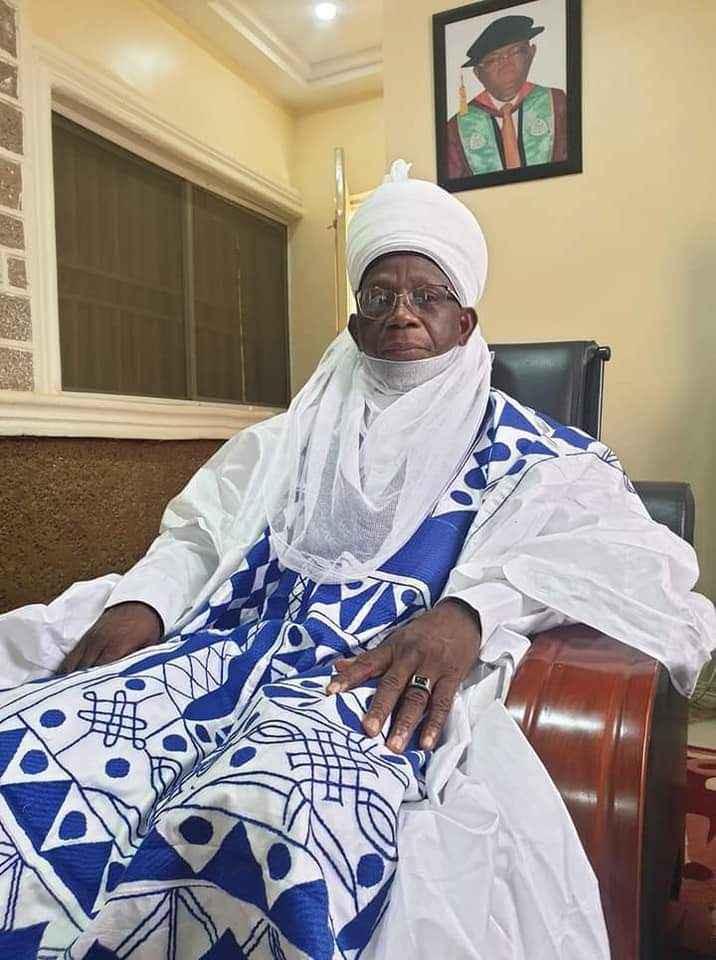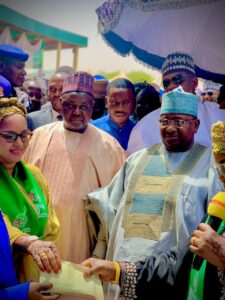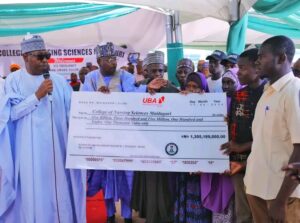
By Mu’azu Abubakar Albarkawa, Kaduna
The major private stakeholders have shown that there is approximately over 10 million children mostly from very poor background that were enrolled into various Tsangaya schools across the northern part of Nigeria.
Tsangaya schools in the North are mostly local in nature and for so many years have not been reformed in a manner that will develop the skills and ability of the students while there is virtually no coordination from various stakeholders across the country to monitor the moral conduct of the students and to instill the required discipline that is desired hence most of them are being exploited to go into drugs and other forms of criminality. They are also vulnerable to recruitment by terrorists’ groups such as Boko Haram and ISWAP.
The coming of the pioneer Registrar of the National Board for Arabic and Islamic Studies, NBAIS, Prof. Muhammad Shafi’u Abdullahi is gradually giving hope for the long-awaited reformation of Tsangaya education across the country.
As a priority for the needed reform, Prof Shafi’u has now succeeded in establishing a Centre for Tsangaya and General Studies. A Director that will oversee the management and administration of the centre and to coordinate with all Tsangaya schools across the country was appointed by the Acting Registrar.
According to an expert in education in Northern Nigeria, Buba Audu, the body called NBAIS has impacted so much in promoting Arabic education under the watch of Prof. Shafiu Abdullahi who came from Ahmadu Bello University, Zaria with vast and many years’ experience.
Over the years, Prof. Shafi’u has deployed his contacts to ensure that the Board remains not only relevant but as an alternative examination body that gives opportunities especially to students of the north that chooses Arabic and Islamic education as a career and profession. As an examination body under Prof. Shafi’u, NBAIS has made it easy and affordable for especially thousands of students across the north to get the needed requirements to further their education in various institutions across the country without compromising standards and performance.
Before the establishment of NBAIS, the teaching of Arabic language and Islamic Studies was restricted to few institutions across the North with little or no effort at both state and federal level to develop local Tsangaya schools despite high enrollment level while opportunities have not been created to develop the skills and capabilities of local students to go higher.
With the multiplicity of Islamic schools and conducts that has not been regulated came the attendant ills of unqualified Islamic clerics, indoctrination of students and pupils, abusive use of pupils by the clerics and the overall neglect of the Islamic education by both the Federal and State Governments.
NBAIS under Prof. Shafi’u and with the full support of the Federal Ministry of Education is gradually achieving alot not only in bringing the needed reforms but by working closely with various stakeholders including the Jama’atu Nasrul Islam, JNI, under the Sultan Sa’ad Abubakar, northern states and their governors in organising lectures, seminars and reaching out to remote Tsangaya schools for re-orientation and given opportunity to develop.
Furthermore, the informal nature of the old ways of teaching Arabic and Islamic Studies plus the multiplicity of Islamic teachers also called Alaranma (Alaranmomi) has made it difficult for these schools to unified and to have a nationally accepted body to conduct examinations for them.
Nonetheless, with the coming of Prof Abdullahi as the Registrar of NBAIS, the teaching of Arabic cum Islamic Studies in the country was rejuvenated when he established the Centre For Tsangaya and General Studies.
Developing the Tsangaya System of Education Program is one of the initiatives of NBAIS. This is being done to address the multiple problems of out-of-school children, abuse of pupils by some unruly clerics, the need to provide accommodation and decent teaching facilities for pupils and to provide a single unified curriculum and certificate for all Tsangaya pupils nationwide.
After succeeding in creating a Centre for Tsangaya and General Studies, NBAIS has completed the building of the Centre which is situated at the premises of the Board. The building of the gigantic structure and equipping it shows the demonstration of the Board under Prof. Shafi’u to promote, improve, regulate and enhance Tsangaya and General Studies. The centre according to insiders will soon be officially commissioned even as full work has since commenced under the Director of the Centre and Saudi trained Islamic scholar, Dr Abubakar Sani Husain.
According to Dr. Husain, the Centre for Tsangaya and General Studies since its inception has identified and conducted training for over 7 million Islamic and Arabic teachers also known as Alaranmomi or mallams in the whole of the country. The training is part of the priority areas of NBAIS under Prof. Shafi’u and is helping so much in developing the skills of the beneficiaries.
NBAIS usually takes full financial responsibilities of such important exercise that has not been available before now in the country. With the steady and gradual success, the Centre for Tsangaya and General Studies is recording, experts are of the opinion that if supported by relevant stakeholders it is capable of checking excesses of criminal recruits especially among Almajiris. The Centre under Dr. Husain is also working with local Islamic teachers that are in-charge of such Tsangaya schools with a view to training them on how best to manage and develop the capacity of the pupils.
The Centre has also been able to get the data of Alaranmomi across the country for easy transmission of instructions to them and for recommendation to parents.
“This is just the first. If we train the teachers of Islamic pupils, they would in turn impact same knowledge to their pupils with the proper teachings according to Islamic tenets”, Dr. Husain added
Another gigantic achievement of Prof Muhammad Shafiu Abdullahi is the success of the Board in getting over 36,141 candidates to write June /July 2019 Senior Arabic and Islamic Certificate Examination nationwide.
Over 28,645 candidates passed while 7, 496 failed some papers, a development and achievement that has never been recorded before now. For the first time, most of such students were opportuned to get the necessary papers and requirements to further their education like their counterparts in other specialised fields of studies.
With the progress been made under Prof. Shafi’u the number of candidates sitting for such exams under NBAIS has since risen to over 70,000, a milestone for the north that has never been recorded before now.
The Director of Centre of Tsangaya and General Studies, Dr Abubakar Sani Husain has lauded the achievements of Prof Muhammad Shafiu Abdullahi.
According to the Director, Prof Abdullahi has brought about revolutionary and positive changes to the NBAIS and have repositioned Islamic schools and scholars (Tsangaya ) to march modern trends worldwide.
Dr. Husain went ahead to explain that in view of the good works that Prof. Shafi’u has done, and in view of his projections for Tsangaya system of education in the whole country, it is necessary to give the Prof more time to build a befitting legacy for Tsangaya schools and for Islam as a whole.
“I Dr Husain is calling on the Federal Government and state Governors in the North to support the Registrar of NBAIS, Prof Hafiz Abdullahi so that he can bring about more innovations in Tsangaya system of education. In order to do that, the Prof needs more time frame and it is necessary for him to have it. I am not saying that because I am the Director of the Centre. I’m advocating for extension for him in the interest of Arabic and Tsangaya education in Nigeria.
He has the qualification, experience, zeal and determination to succeed in addition to the strong contacts and goodwill he enjoys nationally and internationally”.
Dr Husain is not a lone voice in amplifying the laudable achievements of Prof Muhammad Shafiu Abdullahi, the Speaker of the House of Representatives, Hon.Femi Gbajabiamilla had also praised the achievements of NBAIS under the leadership of Prof Abdullahi.
The Speaker who spoke during a workshop in Ilorin, Kwara state by NBAIS in July, 13, 2021
then said, “As a regulator and developer of curriculum for Arabic and Islamic Institutions in Nigeria, NBAIS has a vital role to play in inculcating the spirit of trust, tolerance, patience and religious cautions to our teaming students/youths for peace and harmony in multi and multi religious country like Nigeria”.
The lawmaker then pledged to help provide legislative framework to help the NBAIS achieve its objectives.
National Board For Arabic and Islamic Studies, NBAIS, was formerly established in 1959 by the government of the Northern Nigeria then to help perform the following functions:
a) To develop Curriculum and Syllabus for Arabic and Schools and Centres;
b) To supervise Arabic Schools and Islamic centres;
c) To ensure high enrollment of learners into formal school system that would have otherwise been out of school with accompanying security implications;
d) It was also established to impart specialised knowledge on Arabic and Islamic Studies through Arabic medium as well as formal school subjects;
e) Collaboration with the state ministries of education in recognition and coordination of Arabic/Islamic schools, Colleges and Centers;
f) Collaboration with Nigerian Education Research and Development Council (NERDC) in the area of curricular development;
g) Constant review of syllabus for Arabic/Islamic schools and Colleges;
h) Productions of text books and related learning materials for schools and colleges;
i) Organizing workshop, seminar and conferences for Arabic and Islamic school teachers;
j) Conduction of examination for junior and senior Arabic/Islamic school certificate;
k) Standardization of examination for the award of certificate for Arabic and Islamic schools and colleges;
l) Collaboration with state ministries of education in the quality control of government community, private Arabic/Islamic schools and colleges;
m) Liaison with NGO’s on Arabic/Islamic education for the progress of education in general;
n) Advising federal, state ministries and NGO’s of policies concerning Arabic/Islamic education.
The National Board for Arabic And Islamic Studies was found by the late premier of the defunct northern region, Sir Ahmadu Bello Sardauna of Sokoto in 1960. It is a body that was established as an examination body that conducts National Examinations for Senior Arabic and Islamic Secondary Schools Certificate Examination (SAISSCE), Tahfeez and Science Curriculum which is accredited by the government. NBAIS has gone through series of transformation since its inception it was affiliated to ABU in 1969.
The National Board for Arabic and Islamic Studies has over the years created so many sections among which is the center for Tsangaya Education and General Studies created in 2012.
Tsangaya system of Education is widely spread across the nation (Nigeria), though known with different names and degrees of challenges. With this in mind, after careful deliberation, NBAIS have resolved that initiating center for Tsangaya Education and General studies will play a vital role in minimizing the rate of challenges, this center is one of the most important units of NBAIS, basically formulated to supervise, modernize and improve the Qur’anic schools’ system both modern (Islamiyyah) and local Tsangaya.
The term Tsangaya is adopted from Sangaya in Kanuri, which means educational institution. Therefore, Sangaya is the original name while Tsangaya is a Hausa adulteration of the term.
Thus, Tsangaya refers to the Traditional Qur’anic school system, Tsangaya was established as an organized and comprehensive system of Education for learning Islamic principles, values, jurisprudence and theology with special emphasis to the Holy QuEducatio
MS OF TSANGAYA
According to the Director of the Centre For Tsangaya and General studies, the aims of the Centre for Tsangaya and General Studies as conceived by the Prof Muhammad Shafiu Abdullahi NBAIS amongst others includes;
1. To give sufficient orientation on the importance of modernizing the Tsangaya system of Education and sensitization of the teachers;
2. To inform and educate the Tsangaya Teachers about the remodeling efforts of the Federal Government of Nigeria, and the need for mutual cooperation among the stakeholders for the system’s improvement, under the supervision of the National Board for Arabic and Islamic Studies through the Centre for Tsangaya Education and General Studies towards the Tsangaya Educational system;
3. To heighten the awareness of the tutors towards best practices and for favorable outcomes;
4. To brainstorm with Tsangaya Teachers in order to derive appropriate methodology of teaching and the management of Tsangaya students’ welfare;
5. More so, to infer from Tsangaya Tutor’s first-hand experiences, and observable challenges;
6- Integrating of Tsangaya Education with other productive branches of learning and skills.
Tsangaya System Education Program is one of the initiatives of NBAIS which seeks to address the multiple problems of out-of-school children, abuse of pupils by some unruly clerics, the need to provide accommodation and decent teaching facilities for pupils and to provide a single unified curriculum and certificate for all Tsangaya pupils nationwide.
It started with few schools and colleges in Northern Nigeria. In February, 2011 the National Council of Education (NCE) held its 27th meeting in Sokoto, and gave NBAIS a recognition and approval as the only body that conducts and monitors examinations in Arabic/Islamic schools and colleges which covers the whole nation with over 900 schools and colleges.
Today the National Board for Arabic and Islamic studies is the only recognized body in Nigeria that conducts and monitors examination for Arabic /Islamic Schools and Colleges Nationwide.
VISION
NBAIS is to be at the front line in realizing the ambition of the Federal Government of Nigeria in its program for the integration of western and Islamic education, the promotion of Qur’anic school and madrasah system of education in the country.
LITERAL MEANING OF TSANGAYA
The term Tsangaya is adopted from Sangaya in Kanuri, which means educational institution. Therefore, Sangaya is the original name while Tsangaya is a Hausa adulteration of the term.
TECHNICALLY: – Tsangaya refers to the Traditional Qur’anic school system, Tsangaya was established as an organized and comprehensive system of Education for learning Islamic principles, values, jurisprudence and theology with special emphasis to the Holy Qur’an.
BACKGROUND: –
The traditional Qur’anic school system commonly known as Tsangaya School is almost as old as the history of Qur’anic revelation.
SOME OF THE ACTIVITIES OF THE CENTER FOR TSANGAYA EDUCATION AND GENERAL STUDIES (NBAIS)
1- Orienting the Tsangaya Tutors on how to be effective through organizing workshops, seminars training and consultations;
2- Collecting data of Tsangaya schools across the Nation;
3- Supervising the activities of Tsangaya schools across the Nation;
4- Reviewing and revising the outdated curriculum of Tsangaya schools across the Nation;
5- Working hand in hand with all stakeholders on matters concerning Tsangaya schools;
6- Sorting suitable ways of resolving challenges related to the Tsangaya system of Education such as child abuse, begging and engagement in crimes;
7- Training the Tsangaya pupils on skills acquisition for self-reliance;
8- Inculcating the habit of furthering knowledge in the Tsangaya Tutors and their pupils up to the university level by preparing them academically;
9- Sorting out the strategic ways of reforming, developing and modernizing the Tsangaya system of Education in Nigeria by tutoring, supervising and monitoring;
10 – The need for modernization of Tsangaya Educational System and sensitization of the Teachers.
THE CENTER FOR TSANGAYA EDUCATION AND GENERAL STUDIES SUGGESTED BELOW WAYS FOR THE BEST TSANGAYA MODEL SCHOOLS: –
a) Establishment of governing councils for the schools, as maintaining and promoting Qur’anic schools is not a one-man business, and not just a necessity but an obligation on every person who believes in the divinity of the Glorious Qur’an;
b) Establishment of committees for Tsangaya schools to complement the work of Governing Councils or Board of Governors. Center for Tsangaya Education under NBAIS believe that every school should have three standing committees, which should include education & guidance, welfare, and financial committees;
c) Every school should have an ingenious way of generating income. This is one of the most outstanding challenges that have hindered some genuine efforts in the past. Identifying ways of generating income for running Tsangaya School is very necessary. Center for Tsangaya Education and General studies under (NBAIS), believe that it’s only on this basis that issue of begging in Tsangaya would be solved.
The suggested ways include:
1) Establishing an organized reward-oriented farm for healthy and mature students and volunteers to maintain necessary contribution from parents and members of the council and committees;
2) Soliciting and collecting Zakat (compulsory alms) – both in cash and kind;
3) Sourcing for International assistance from foreign Organizations like Islamic Development Bank (IDB), Muslim World League and Islamic Relief Organization.
The Northern Governors, who are championing the Government initiatives and defending it vigorously, need to come forward and present their Zakat to Tsangaya system as the Month of Ramadhan approaches.


